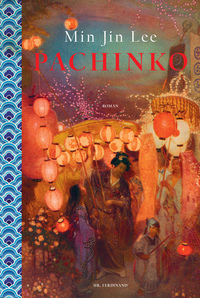Take a photo of a barcode or cover
challenging
emotional
reflective
medium-paced
Plot or Character Driven:
Character
Strong character development:
Yes
Loveable characters:
Complicated
Diverse cast of characters:
Yes
A lot of stuff happened in this book. Also a lot of tears were shed.
I quite liked it! I hardly ever wanted to put this book down. The characters were (mostly) great, and while a lot of things did happen, it never felt too much or contrived.
A woman's lot is to suffer, and this certainly rang true Sunja.
I quite liked it! I hardly ever wanted to put this book down. The characters were (mostly) great, and while a lot of things did happen, it never felt too much or contrived.
A woman's lot is to suffer, and this certainly rang true Sunja.
emotional
reflective
medium-paced
Plot or Character Driven:
A mix
Strong character development:
Yes
Loveable characters:
Yes
Diverse cast of characters:
Yes
Flaws of characters a main focus:
Yes
emotional
informative
reflective
sad
slow-paced
Plot or Character Driven:
A mix
Strong character development:
Complicated
Loveable characters:
Yes
Diverse cast of characters:
Yes
Flaws of characters a main focus:
Yes
challenging
emotional
reflective
sad
medium-paced
Plot or Character Driven:
Character
Strong character development:
Yes
Loveable characters:
Yes
Diverse cast of characters:
No
Flaws of characters a main focus:
No
liked how the author illustrated each generation’s story and learned a lot about the history of japan & korea
emotional
hopeful
informative
reflective
medium-paced
Plot or Character Driven:
A mix
Strong character development:
Yes
Loveable characters:
Yes
Diverse cast of characters:
Yes
Flaws of characters a main focus:
N/A
Moderate: Adult/minor relationship, Alcoholism, Racism, Sexual content, Suicide
emotional
hopeful
reflective
slow-paced
Plot or Character Driven:
A mix
Strong character development:
Yes
Loveable characters:
Yes
Diverse cast of characters:
Yes
Flaws of characters a main focus:
Yes
Initial thoughts: I wanted to give this book 5 stars. The first third of the book was superb; as someone with very little background on the Japanese occupation of Korea, I think the book navigates the complexities, the discrimination, and the expectations imposed on Korean women at the time in a way that’s educational to me as someone from the Western World. I think there’s a lot to draw parallels to in the modern world. The second third of the book is where I started to lose steam; there are more significant feeling time jumps that made it difficult to feel close to Noa and Mozasu because we as the reader never get to know them for very long, so it earns probably a 3.5 or a 4/5. The final third of the book, I would honestly rate a 2/5. The time jumps are too big and I found myself flipping between chapters to confirm that the time jump was indeed 6 years after a significant suicidal. This last part felt rushed and was irritating to see character deaths be minimized.
Book 1:
Sunja is a teenage Korean peasant who falls in love with an older, richer man (gag but accurate for the time period I suppose). Hansu is, for lack of better terms, an icky man who is stalking this poor girl despite being married and having his own children. She becomes pregnant and learns about his other life; even though he offers to care for her, she refuses because she’ll bring shame on her family. I think this part of the story really encapsulates what it meant to be a girl/woman at the time and you have to feel bad for this girl that was the victim but knows society will not see her that way. It’s a harsh reality.
Sunja is saved because Isak, our Christian Tuberculosis-ridden handsome boarder, learns about her pregnancy and goes “WWJD? (what would jesus do?)”. His answer shocks everyone because he offers to marry Sunja and raise her baby, despite not really knowing each other. From a modern lens, this should be seen as weird. From a historical lens, it is also weird. Sunja isn’t even a Christian at this point! They marry and move to Osaka, Japan with Isak’s brother. Yoseb is concerned and his wife Kyunghee just seems happy to have another woman in the house. It works out. Hansu and Sunja’s baby Noa is born.
Book 2:
Eventually Sunja/Isak have Mozasu. Shortly after though, Isak and his motley Christian crew are arrested because they refuse to pledge their allegiance to the Emperor. It’s an understandable act of defiance, but as a cowardly reader, it’s easy to get annoyed that Isak wouldn’t just lie to stay with his family. With that said, Isak’s treatment as a prisoner for multiple years is a testament to just how shitty life was for a Korean in Japan. He eventually gets sent home to die; this is where I start to complain. It’s extremely annoying to end a chapter with Isak alive, but dying, and start the next one hoping he has somehow pulled through, only to unceremoniously learn that he died.
This book dives into WW2 and how Sunja navigates earning money without a husband and with a BIL that borders on abusive if not outright misogynistic because he feels like less of a woman for not being able to provide enough for the household. To an extent it’s understandable; we know Yoseb is paid half of what a Japanese foreman would earn, solely for being Korean. It’s understandably a horrible position to be in at the time where men are expected to be providers and worse still knowing that Yoseb and Isak come from a rich land owning family in Northern Korea.
Sunja (and Kyunghee) hit a stroke of luck after peddling food on the streets and they’re offered a salaried job in a restaurant that’s the equivalent of $8 USD week each, with food. It’s a miracle that Yoseb is against but they get to do it!! Until we learn that SURPRISE!! Hansu is back and has apparently been bankrolling their lives because of Noa. He sends them to work on a sweet potato farm knowing that Osaka will be bombed and we bite our nails knowing that Yoseb accepts a job in Nagasaki.
Hansu wants to be more involved with Noa but Sunja refuses; they eventually move back to Osaka after the war and they struggle to make ends meet knowing that Noa wants to go to a prestigious university. We learn more about the abhorrent bullying both Noa and Mozasu face at school that inadvertently leads to Mozasu dropping out to work at Pachinko parlors.
Noa gets into the university (which Hansu paid for in secret) and gets a Japanese girlfriend who is the modern day equivalent of “I’m not a racist!! I’m friends with Black people” and when they break up, she tells Noa that Hansu is 100% his biological father not just a benefactor after spending an hour together.
Noa drops out and runs away.
Book 3:
This book is a hodge podge of different characters and time jumps- in short: Noa starts over in a new city and has a family, he is funnily enough working for a pachinko parlor. Mozasu becomes a millionaire owning pachinko parlors and has a son named Solomon that grows up to be who we all imagined Noa would be: a flashy Ivy League graduate with a degree in finance.
At this point, we are all waiting for Yoseb to die, Kyunghee is barely a character, and Sunja herself is scarcely mentioned. She eventually finds Noa with Hansu’s help, but after she finds him, he kills himself.
Solomon eventually gets fired from his firm after closing a real estate deal with his father’s involvement because they suspect the Yakuza of being involved with an old lady’s death, even though there was 0 involvement. He also breaks up with his Korean girlfriend because he turns to help his father with the Pachinko business and she’s a Korean American that despises Japan.
The ending is rather unsatisfying, tragic, and has an anti-Japanese sentiment that makes the entire book feel incredibly biased; we should expect it from books and I won’t judge the book for this, but there’s more emphasis on the horribleness of the Japanese rather than the feelings of Korean-Japanese people in this book that leave an awkward taste in my mouth.
Book 1:
Sunja is a teenage Korean peasant who falls in love with an older, richer man (gag but accurate for the time period I suppose). Hansu is, for lack of better terms, an icky man who is stalking this poor girl despite being married and having his own children. She becomes pregnant and learns about his other life; even though he offers to care for her, she refuses because she’ll bring shame on her family. I think this part of the story really encapsulates what it meant to be a girl/woman at the time and you have to feel bad for this girl that was the victim but knows society will not see her that way. It’s a harsh reality.
Sunja is saved because Isak, our Christian Tuberculosis-ridden handsome boarder, learns about her pregnancy and goes “WWJD? (what would jesus do?)”. His answer shocks everyone because he offers to marry Sunja and raise her baby, despite not really knowing each other. From a modern lens, this should be seen as weird. From a historical lens, it is also weird. Sunja isn’t even a Christian at this point! They marry and move to Osaka, Japan with Isak’s brother. Yoseb is concerned and his wife Kyunghee just seems happy to have another woman in the house. It works out. Hansu and Sunja’s baby Noa is born.
Book 2:
Eventually Sunja/Isak have Mozasu. Shortly after though, Isak and his motley Christian crew are arrested because they refuse to pledge their allegiance to the Emperor. It’s an understandable act of defiance, but as a cowardly reader, it’s easy to get annoyed that Isak wouldn’t just lie to stay with his family. With that said, Isak’s treatment as a prisoner for multiple years is a testament to just how shitty life was for a Korean in Japan. He eventually gets sent home to die; this is where I start to complain. It’s extremely annoying to end a chapter with Isak alive, but dying, and start the next one hoping he has somehow pulled through, only to unceremoniously learn that he died.
This book dives into WW2 and how Sunja navigates earning money without a husband and with a BIL that borders on abusive if not outright misogynistic because he feels like less of a woman for not being able to provide enough for the household. To an extent it’s understandable; we know Yoseb is paid half of what a Japanese foreman would earn, solely for being Korean. It’s understandably a horrible position to be in at the time where men are expected to be providers and worse still knowing that Yoseb and Isak come from a rich land owning family in Northern Korea.
Sunja (and Kyunghee) hit a stroke of luck after peddling food on the streets and they’re offered a salaried job in a restaurant that’s the equivalent of $8 USD week each, with food. It’s a miracle that Yoseb is against but they get to do it!! Until we learn that SURPRISE!! Hansu is back and has apparently been bankrolling their lives because of Noa. He sends them to work on a sweet potato farm knowing that Osaka will be bombed and we bite our nails knowing that Yoseb accepts a job in Nagasaki.
Hansu wants to be more involved with Noa but Sunja refuses; they eventually move back to Osaka after the war and they struggle to make ends meet knowing that Noa wants to go to a prestigious university. We learn more about the abhorrent bullying both Noa and Mozasu face at school that inadvertently leads to Mozasu dropping out to work at Pachinko parlors.
Noa gets into the university (which Hansu paid for in secret) and gets a Japanese girlfriend who is the modern day equivalent of “I’m not a racist!! I’m friends with Black people” and when they break up, she tells Noa that Hansu is 100% his biological father not just a benefactor after spending an hour together.
Noa drops out and runs away.
Book 3:
This book is a hodge podge of different characters and time jumps- in short: Noa starts over in a new city and has a family, he is funnily enough working for a pachinko parlor. Mozasu becomes a millionaire owning pachinko parlors and has a son named Solomon that grows up to be who we all imagined Noa would be: a flashy Ivy League graduate with a degree in finance.
At this point, we are all waiting for Yoseb to die, Kyunghee is barely a character, and Sunja herself is scarcely mentioned. She eventually finds Noa with Hansu’s help, but after she finds him, he kills himself.
Solomon eventually gets fired from his firm after closing a real estate deal with his father’s involvement because they suspect the Yakuza of being involved with an old lady’s death, even though there was 0 involvement. He also breaks up with his Korean girlfriend because he turns to help his father with the Pachinko business and she’s a Korean American that despises Japan.
The ending is rather unsatisfying, tragic, and has an anti-Japanese sentiment that makes the entire book feel incredibly biased; we should expect it from books and I won’t judge the book for this, but there’s more emphasis on the horribleness of the Japanese rather than the feelings of Korean-Japanese people in this book that leave an awkward taste in my mouth.
Wow, this book had me hooked from the beginning. It spans many years, several generations, wars, births, deaths, all within one family. So much happened in this book, and yet I never felt like I missed out on anything. I felt as if I'd been with the characters through all these years, all these ups and downs. When I read the last chapter, I truly felt like the beginning had been so many many years ago. I was totally transported. Full of unexpected events and really tough moments. It's been a while since I've read such a satisfying book. I also learned a lot about Koreans in Japan after WW2, and how they struggled and didn't quite belong anywhere. Really a great read!



